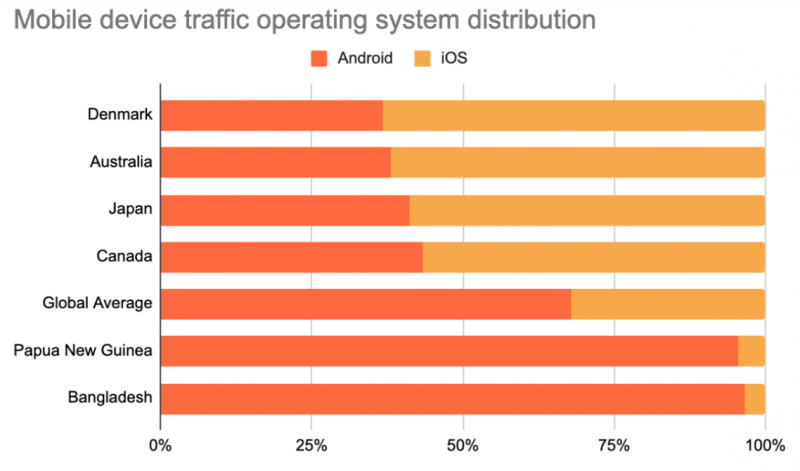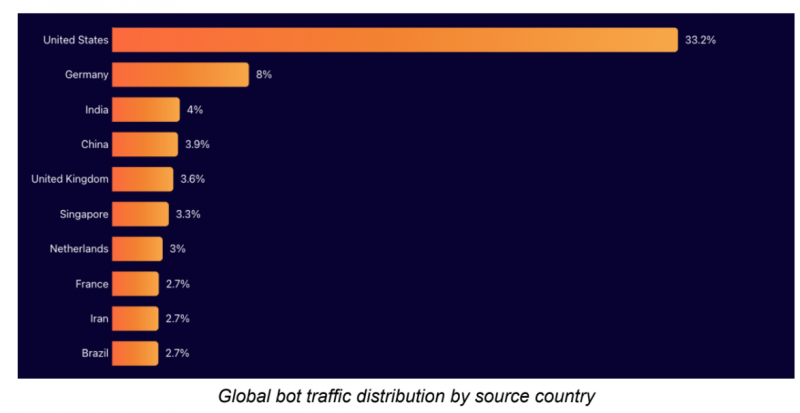 SECURITY
SECURITY
 SECURITY
SECURITY
 SECURITY
SECURITY
As massive as it already is, global internet traffic grew by 25% from last year, with Google the most popular general service provider and OpenAI the most popular generative AI provider, Cloudflare Inc. revealed today in its annual review of global internet traffic and trends based on its Radar telemetry.
Starlink made high-performance internet available in previously unserved areas and nearly tripled its overall traffic in 2023 from last year. This was especially apparent in countries that initiated service such as Brazil, where traffic grew over 17 times.
Iceland showed the best results of any country across all of Cloudflare’s quality metrics, which the company attributes to an extensive fiber network.
Speaking of quality connections, Cloudflare made a pitch for using the latest HTTP/3 protocol called QUIC. “It can deliver improved performance by mitigating the effects of packet loss and network changes, as well as establishing connections more quickly,” the company said. “It also provides encryption by default, mitigating the risk of attacks. Websites and applications that remain on older versions of HTTP miss out on these benefits.”
Cloudflare found a fifth of total traffic is already using this protocol. Interestingly, Nepal, Thailand, Malaysia and Sri Lanka were its biggest users during 2023, perhaps because they lack legacy installations using older protocols.
The same can be said for IPv6, which has been around for decades but is still far from being universally adopted. Indian and Malaysian providers have made IPv6 more popular and other countries aren’t far behind. Nevertheless, the report says, “lagging adoption across such a large cohort of countries/regions 25 years after IPv6 was first published as a draft standard is quite surprising.”
Android devices originated two-thirds of mobile-based traffic, and there are more than two dozen places around the world where Android traffic has more than a 90% share of all mobile traffic. The highest proportions can be found in Bangladesh and Papua New Guinea, as shown in the bar chart below.
The authors claim that this shows where lower-cost phones play to Android’s adoption and usage. At the other end of the economic spectrum are countries such as Denmark, Australia and Japan, where iOS-based phones top 70% traffic shares.

The report also found 180 internet outages during the year, many from government-mandated shutdowns such as were seen in Mauritania and Gabon. Iraq frequently shut down its internet service across many hours to prevent exam cheating. Some outages were the result of major weather issues, such as a typhoon in Guam during May.
Perhaps an indication of what’s to come, almost 2% of all TLS v1.3 traffic, the most recent version of this protocol, is using post-quantum encryption. That refers to future advances using more powerful quantum-based computers that could capture and decrypt this data. “With future Chrome updates and as other browsers add support for post-quantum encryption, we expect this share to continue to grow rapidly in 2024,” they wrote.
Because of the amount of traffic Cloudflare handles, it can be an early warning system of major security trends. It found “that attackers may have started to shift strategies in August, as the percentage of emails containing deceptive links began to fall while the share proposing to extort the recipient began to increase.”
It analyzed the origins of malicious bot traffic and found nearly 12% comes from Amazon Web Services, and over 7% from Google. Nearly a third of total bot traffic originates from U.S. providers, as shown in the bar chart below.

Support our mission to keep content open and free by engaging with theCUBE community. Join theCUBE’s Alumni Trust Network, where technology leaders connect, share intelligence and create opportunities.
Founded by tech visionaries John Furrier and Dave Vellante, SiliconANGLE Media has built a dynamic ecosystem of industry-leading digital media brands that reach 15+ million elite tech professionals. Our new proprietary theCUBE AI Video Cloud is breaking ground in audience interaction, leveraging theCUBEai.com neural network to help technology companies make data-driven decisions and stay at the forefront of industry conversations.